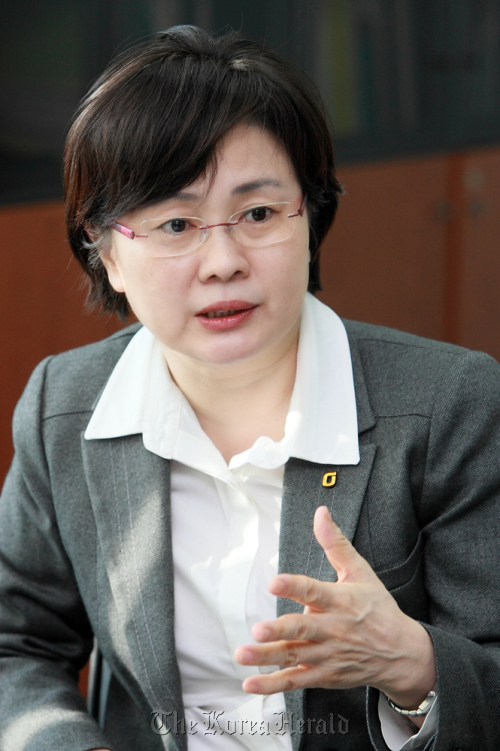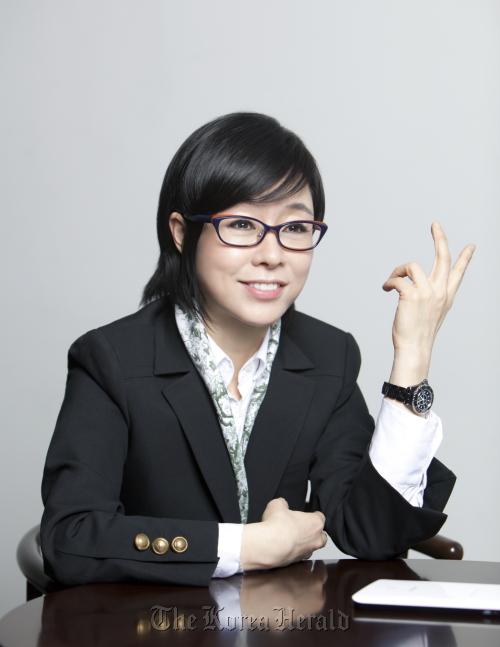In the early days of her 30-year career, Lee Young-hui, executive vice president for Korea’s telecom titan KT Corp., said that she had to challenge the norm and work hard to earn even things taken for granted by her male colleagues.
“I didn’t imagine promotion was possible for women,” Lee told Yonhap News Agency in a recent interview in her office south of Seoul. “Back then, women were not even eligible for overseas duties.”
Lee, 54, who started out as the first female manager in Korea’s telecom history, broke these unspoken rules. She completed her master’s in Belgium after amending the company’s rules for overseas training, previously opened only to men who completed the nation’s mandatory military duty. She later became head of the company’s Beijing bureau and, in 2005, the first female vice president.
 |
Lee Young-hui, executive vice president of KT Corp. (Yonhap News) |
She is a rare female engineer who has climbed to the top of the corporate ladder in the male-dominated Korean business circle, where late-night boozing sessions and golf tours still remain popular methods of building networks and trading business information.
Korea’s public sector has seen a steady rise of women in the past years. Sixty percent of the country’s new foreign service officers in 2010, for example, were women.
But the number of women is still disproportionately small in the country’s private business sector. Narrow it down to those who stayed long enough to advance to executive levels, and it seems safe to say that Korea’s corporate decisions are made by men only.
In 2010, six out of top 10 corporations in Korea by market cap had no single female executive, according to Democratic Party lawmaker Kim Choon-jin. Women accounted for 1.1 percent of the executive-level officials at top 100 Korean companies in 2009, according to the latest data from the labor ministry.
However, such a disparity may start to shift, albeit slowly, at least in the country’s technology-intensive telecom and electronics sectors, where women can have a competitive edge over men, experts say.
Two business leaders who have been most vocal about securing more female talents are Lee Suk-chae and Lee Kun-hee, chairmen of KT and Samsung Electronics Co., which boast the largest number of female executives among the country’s top 30 corporations.
 |
Lee Young-hee, executive vice president for Samsung Electronics. |
Though the proportion of female executives is still tiny, with 4 percent working for KT and 1 percent for Samsung, the way the technology trends unfold these days calls for more diverse approaches than just those of men, officials said.
Leaders in the mobile and technology industries are asked to be keen on computer or mobile software, be marketing-savvy and anticipate the taste of consumers who are not necessarily tech geeks.
Women can compete competitively with men in these qualifications, KT’s first female vice president said.
“Domestic companies’ top priority these days after Apple’s
(iPhone) advance into Korea is to build a software power. Women can be very competitive in this area,” she said.
With the popularity of touchscreen smartphones and tablet computer devices, electronics gadgets are evolving to become easier and more intuitive to use. And as consumers like senior citizens and children are also seen as potential consumers for electronics makers these days, tech companies need insights from those who may not necessarily have degrees in computers or engineering, but who can speak from the point of view of these commoners outside “techie” groups, a Samsung executive argues.
“In the past, when the technology was something difficult, there was no marketing for IT products like there is today,” said Lee Young-hee, 47, an executive vice president for Samsung’s mobile marketing team. “Now, we need marketing that links humans and technology (which has) meaningful innovations that are relevant to consumers.”
“I don’t have a Ph.D. and I’m not an engineer but I provide such insights into the product’s development process,” she added.
After more than 15 years of marketing consumer and cosmetic goods, she joined the tech giant’s mobile phone team as one of its 11 female executives in 2007.
While the business and technology environments may be evolving more favorably for future female leaders, it is no doubt that society, the government and the family have their roles to play as these women try to juggle work and family and to break glass ceilings in male-dominated Korean corporations.
“A lot of women land a job in business ― 30 percent of the newly hired at KT are women now ― but few of them keep up and develop their long-term career path, partly because of marriage and childcare, partly because they fail to adapt to the corporate culture,” said KT’s Lee Young-hui. “For women to survive longer in business, they need more role models, flexible work environments that support child rearing and more opportunities in critical positions.”
And the final piece of advice, she adds, “I also had hard time adapting to KT but I endured it. So persevere. You’ll see the fruits of your career.”
ylee@yna.co.kr (Yonhap News)








![[Today’s K-pop] Blackpink’s Jennie, Lisa invited to Coachella as solo acts](http://res.heraldm.com/phpwas/restmb_idxmake.php?idx=644&simg=/content/image/2024/11/21/20241121050099_0.jpg)
